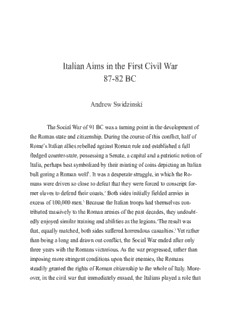
layout 2 - McGill University PDF
Preview layout 2 - McGill University
Italian Aims in the First Civil War 87-82 BC Andrew Swidzinski TheSocialWarof 91BCwas aturningpointinthedevelopmentof theRomanstateandcitizenship.Duringthecourseof thisconflict,halfof Rome’sItalianallies rebelledagainstRomanruleandestablishedafull fledgedcounter-state,possessingaSenate,acapitalandapatrioticnotionof Italia,perhaps bestsymbolizedbytheirmintingof coinsdepictinganItalian bullgoringaRomanwolf1.Itwas adesperatestruggle,inwhichtheRo- mansweredrivensoclosetodefeatthattheywereforcedtoconscriptfor- merslaves todefendtheircoasts.2Bothsides initiallyfieldedarmiesin excess of100,000men.3BecausetheItaliantroops hadthemselves con- tributedmassivelytotheRomanarmies ofthepastdecades,theyundoubt- edlyenjoyedsimilartrainingandabilities asthelegions.4Theresultwas that,equallymatched,bothsidessufferedhorrendouscasualties.5Yetrather thanbeingalonganddrawn outconflict,theSocialWarendedafteronly threeyears withtheRomans victorious.As thewarprogressed,ratherthan imposingmorestringentconditionsupontheirenemies,theRomans steadilygrantedtherightsofRomancitizenshiptothewholeofItaly.More- over,inthecivilwarthatimmediatelyensued,theItaliansplayedarolethat 119 HIRUNDO 2007 seemedradicallydifferentfromthatof aconqueredpopulation.Theyde- ployedenormous armiestosupportbothsidesintheconflict,andbytheend of thewar their politicalrights hadbeensignificantlyenhanced. Severalimportantquestionshavearisenas tothecausesandthena- tureof this conflict.Theancientsources, of whichtherearefew for thepe- riodinquestion,vieweditlargelyas aresponseonthepartof theItalian allies totherefusalof theRomans tograntthemthecitizenship,andthus allowthemtoshareinthebenefits of theempirewhichhadbeencreatedin greatpartduetotheeffortsof their own soldiers. This istheviewtakenby Appian,anAlexandrianGreekwho composedahistoryof Rome’scivil wars duringthereignof theEmperorAntoninusPius, andVelleiusPatercu- lus,aRomanknightwho wroteduringtheprincipateofTiberiusandwas himselfdescendedfromparticipants intheconflict.6Their view has beende- fendedbymanymodernscholars,notablySherwinWhite(1971), Brunt (1988)andKeaveney(2004).YetbothAppianandVelleiuslivedinperiods inwhichtheideaofuniversalcitizenshiphadbecomecommonamongthe Romans, andItalyandRomehadcometobeviewedasoneandthesame, andso theymayhavereshapedthenarrativeinaccordancewiththeirown inherentbiases.7AnothertraditionispreservedbythehistorianDiodorusof Sicilywho wroteinthe1stcenturyBC.Hedescribes arevoltofthe“nations ofItalyagainstRome’sdomination”anddescribesthenewlyestablished Italianstate8inamannerthathasledsomehistorians, notablyMouritsen (1998)toconcludethattherevoltwas motivatedbyadesiretooverthrow Romanhegemonyandestablishastatemoreinkeepingwiththediversecul- AndrewSwidzinski ItalianAimsintheFirstCivilWar87-82BC 120 turaltraditionsof non-RomanItaly. Many of Mouritsen’sargumentsareconvincing.Itisunlikely, as he has demonstrated,thattheItalians hadbecomeculturallyassimilatedtothe Romans inthe2nd centuryBC,9or thatallalliedcommunities feltRoman citizenshiptobemoredesirablethantheir existingprivileges.10 Butitre- mains, however,difficulttoignorethewidespreadmovementamongboth theItalianaristocracyandthecommonpeopletoobtainbothRomanciti- zenshipandgreater influenceintheRomanvotingassemblies.Thismove- mentmanifesteditselfnotonlyintheyearspriortotheSocialWar,butmost notablyintheperiodafter ithadbeenconcluded.Mouritsenlargelyignores theperiodbetween87and83BC.,andindoingso neglectswhatislikely thestrongestcaseinfavour of anItaliandesirefor theRomancitizenship.11 Withtheexceptionof theSamnites,Italianresistancehadquicklycollapsed after thepassageof laws grantingcitizenship.Oncethatcitizenshiphad beenshown toincludewhatamountedtosecondclass statusinthevoting assemblies,theItaliansputmassivepoliticalandmilitarysupportbehind Romanpoliticianswillingtoequalizethesituation.As aresulttheysuc- ceededingainingalloftheconcessions theyhadaskedfor atthebeginning oftheSocialWarwhileeventheirmostbitterideologicalopponentswere forcedtoaccepttheirnewfound politicalstatus. This paperwillfocusupon theroleofthenewlyenfranchisedcitizens intheperiodbetweentheconclu- sionoftheSocialWarandtheirinfluenceupontheCivilWarbetweenthe factionsofCinnaandSulla. TheSocialWarcanbroadlybedividedintothreephases. Inthefirst 121 HIRUNDO 2007 phase,from91toearly90BC,theItalians enjoyedtheinitiative,winning multiplevictories over theirRomanopponentsandkillingtwoRomancon- suls inbattle.12 During this periodtheyestablishedacapitalcityat Corfinium,intheterritoryof thePaeligni,andestablishedaSenatemadeup of theleadingmenof thevariousnationswho hadjoinedtherevolt13 In the secondphase, beginningin90BC,theRomansgrantedcitizenshiptoall Latinandalliedcommunitiesnotyetinrevolt.AccordingtoAppian,this hadtheeffectof making“theenemyunderarmslesshostileoutof hopeto winsomethingsimilar”14Thetideof thewarthenturneddecisivelyinfavour of theRomans, as theConsulPompeiusandthelegateSulla,theybeganto regainterritoryfromtheSamnites andtheMarsi.15Thethird phasebegan withthepassage in89of theLexPlautiaPapiria,whichallowedfor theen- rollmentof allItalians who submittedwithin60days andpresentedthem- selves beforeaPraetor.16 Bythis timemostresistancehadended17,withonly theSamnites retainingaserious military presenceinsouthItaly.18 Yetdespitetheirapparentdefeat,theItalianswouldsoonafterwards reasserttheirpresenceinRomanpolitics. Mouritsenarguesthatthedefeatin theSocialWarhadbeenentirelymilitaryinnatureandhadbeendecidedby superiorRomannumbers19.Ifthiswerecorrect,onewouldnotexpectthe Italians tohaveinvolvedthemselvesextensivelyinthepoliticaldebatesthen goingoninRome,tohavesoughtanexpansionoftheircivicrightsorto havefieldedmassivearmies inacivilwar thatfollowedonlyafewyears aftertheirdefeat.ItisfarmorelikelythattheRomansrecognizedtheextent towhichtheirvictoryhaddependedupontheenfranchisementofthenew citizens andwerepreparedtoactaccordingly.Thegrantsofcitizenshipbe- AndrewSwidzinski ItalianAimsintheFirstCivilWar87-82BC 122 tween90and89BChadgiventheItalians thecitizenshipbuthadplaced themineightnewlycreatedvotingtribes whichwouldvoteafterthe35 tribes of originalRomancitizens,anarrangementthatwouldmaketheir votes meaningless.20AmbitiousRomanpoliticians,viewingthenew citizens as amassivepoliticalconstituencytoemployinsupportof theirown ambi- tions,immediatelybegantoappealtotheir desirefor anequalredistribu- tion.In88BCthetribuneSulpicius,perhaps inabidtoadvancehisown politicalcareer,promisedtoredistributethenew citizens overthewholeof theexisting35tribes. In thisheenjoyedthesupportof Gaius Marius,who hopedtorevivehis owncareer byattachinghimselftothecauseof redistri- bution,andthusgainthesupportof thenow decisiveItalianvotersinhis questfor anew military command.21 Marius andSulpicius wereableto bringinsufficientsupportfromamongtheItalianstopush themeasure throughtheassembly,andforcedtheConsuls SullaandPompeiustoat- tempttosuspend publicbusiness inordertopreventthechaosthatensued whenamobmadeofnewcitizens attackedtheoldcitizenswho didnot wish towish toseetheweightoftheirvotesdiluted. TheMarianmobsucceededinpassingboththeredistributions, and handingovercommandofthecomingwaragainstMithridatesofPontus to Marius. TheconsulLuciusSullawasabletorestorethestatusquoby marchingonRomeattheheadofaprivatearmy,buthissupporterswere unabletomaintainhis settlementoncehehaddepartedtodealwithMithri- dates inAsia.WithinmonthsofSulla’sdeparture,thenewlyelectedconsul LuciusCornelius CinnareintroducedthelegislationofSulpicius22,when he was unsuccessful indoingsoandwas ejectedfromRomebypartisans of 123 HIRUNDO 2007 Lucius CorneliusSulla,heimmediatelyappealedtotheItaliancommunities onthegrounds thatitwas “ontheir accountthathehadincurreddisaster”23, andwas abletoraise anarmynumbering30legions.24Mariuswas ableto raiseanother largeforceinEtruriawithpromisestochange,inthewords of Appian,“themethodof voting,whichconcernedthempassionately”.25To- gethertheymarchedonRomeattheheadof mostlyItaliantroops.Thatthey wereabletoinvolvethenew citizens intheirstrugglewithsuch easeis tes- tamenttothedegreetowhichItalians wereconcernedwiththenatureof theircitizenship.Thisconcernis madeevenmoreevidentwhenoneconsid- ers thattheywerebeingappealedtoonthegrounds of theirabilitytopartici- pateinelections andlegislativeassemblies,thepoliticalinstitutionsof the Republic,ratherthansimplyenjoyingthelegalprivilegesof Citizenship. Moreover itis notablethattheywere,inthenextfew years,abletoputeven largerforces intothefieldbaseduponpledgesof thisnature.Appian(BC. 1.79,1.82) claimsthattheyraisedover100,000tofightSullain83.Velleius (2.24.4.)estimates aCinnnanarmyof200,000. Plutarch(Sulla27)esti- mates thattheCinnanarmylaterraisedtofightSullanumbered450cohorts, whichwouldmeantanarmyofover200000,ifwe assumethateachlegion includedbetween6and10cohortsandthateachlegionnumberedaround 4,000men. Florus (2.18.)estimates thattheynumbered8legionsand500 cohorts,orroughly282,000. Evenifwe acceptthemoreconservativefig- ureprovidedbyAppian,thearmies raisedbytheCinnansarestillremark- able.Theveryfactthattheywereabletoputsuchforcesintothefieldin itselfsuggests thattheSocialWarhadnothadasdamaginganeffectupon theItalianpopulationaswassupposedandthattheycouldlikelyhavekept AndrewSwidzinski ItalianAimsintheFirstCivilWar87-82BC 124 ontheconflictfor longer,ifthecitizenshiphadnotbeenofferedthem. After theinitialchaosthatfollowedtheimmediatereturnof Marius, theCinnans proceededtogovernandkepttheirpromisebytoredistribute thenew citizens inthecensus of 86BC.Itisgenerallyacceptedthatsucha census didtakeplace.26 Somescholars,notablyWiseman(1969) andKeav- eney(2004),havedeniedthatthecensus of 86carriedouttheproposed equalredistributionthroughoutthe35tribes27.Theirargumentrests upon twopieces of evidence.Thefirstis thatLivymentionsadecreeof theSen- atetogivethenew citizens therighttovotein85or 84BC.Thiswould suggestthatCinnahadnotdonesountilitbecamenecessary toinsuretheir supportinthecomingstrugglewithSulla.28 Thesecondis thatthenumber of adultmalecitizens recordedinthecensus numberedonly463,000ac- cordingtotheChristianscholarSaintJerome,as opposedtothe394,000 citizens recordedbyLivyfor theyear 115BC.29These figures wouldsug- gestthat,ifoneaccounts for populationgrowth, few ifanynew citizens had beenaddedtotherolls.Thatthenumberofadultmalesregisteredinthe census of70BCnearlydoubledto900,000wouldservetoconfirmthat onlythenhadthenewcitizens beenenfranchised.30 Bothofthesearguments, however,canbedismissed.TheLivian epitomeindicates thatthenewcitizens weregiventherighttovote,some- thingthattheywouldhavepossessedalreadyundertheLexJulia,thuscast- ingdoubtupontheaccuracyofthesource.31To assume,as Keaveneydoes,32 thatthedecreemeantagenuineredistributionofthecitizenswouldalsobe excessive,giventhatsuchameasurecouldonlyhavebeenimplemented throughoneofthelegislativeassemblies33.Moreover,thereis significant 125 HIRUNDO 2007 enoughevidencethattheCinnans didkeeptheirpromisebeforehand.Had they, as Keaveneycontends, refusedtoimplementtheredistributionsuntil 84,therewouldsurelybesomeindicationof itinthesources.Appiantraces theissueof citizenshipobsessivelythroughouthisnarrative,andgivenhis toneof generalhostilitytowards Cinna,itisdoubtfulthathewouldhave passedupanopportunitytodemonstratethattheConsulhadbrokenhis promiseandthattheredistributions hadonlybeenmadeatamomentin whichitwas convenienttohisconductof thewar.Yethementionsnothing of thekind.Whathedoes indicateisthatthelaws madeduringthefirstcon- sulshipof Sullawererepealed—whichpresumablywouldhavemeantthat theredistributionspassedbySulpiciuswouldbebackinforce34—andthat theCinnanswereabletousetherecentmeasuresas arecruitingtactic amongtheItalians,somethingwhichevenKeaveneyadmitswouldhave beendifficulthadtheybeenseentohavebeenreluctantinimplementing theiroriginalpledge.35 Moreover,giventhebehaviouroftheItaliansinthepast,itishighly unlikelythattheywouldhavemeeklyacceptedacensusinwhichtheywere notredistributed36orthecensorialmeddlingpositedbyBrunt.37Italians had beenpreparedtoshow uponmassetodeclarethemselvesascitizensinthe census of97BC.38 Onlyrecently,theyhadcometoRomeinsufficiently largenumberstoramSulpicius’redistributivelegislationthroughthePle- beianAssemblyandengageinlargescalemobviolenceagainstthosewho opposedthemeasure.39Moreimportantlytheyhad,despitetherecentexperi- enceoftheSocialWar,beenwillingtofieldmassivearmiestosupport AndrewSwidzinski ItalianAimsintheFirstCivilWar87-82BC 126 CinnaandMarius intheirmarchonRome,andwoulddoso againwithina few years. Itis difficult,therefore,toconceivethattheywouldhaveac- ceptedanythingless thanarapidfulfillmentof thepromisedredistribution, especiallyif acensus,themethodbywhichcitizenshipcouldbeformalized, werebeingheld.Itisindeedmorelikelythatatleastsomeof themwould havegoneso faras toresumeactivewarfareagainsttheRomans. Otherexplanationsmaybefurnishedfor theSenatorialdecree recordedbyLivy.Theepitomewithinwhichitistobefound largelydeals withassertions of Senatorialauthorityinthemonthsleadinguptothewar. TheSenatehadlaunchedadeterminedpeaceinitiativeandhadevencon- vincedtheCinnans toendorseaproposalfor allarmiestobedisbanded. Theywereunsuccessfulhowever,inconvincingCarbotocometoterms withSulla.40Theyhadalso beguntoobjecttothehighhandedmanner of the new Consul,demonstratedbyhisdelayinconductinganelectionfor his successor.41 IntakingstancesdesignedtoappeasetheItalians,thecorecon- stituencyoftheCinnans, suchas oppositiontothetakingofhostagesfrom Italiancities andaconfirmationof existingvotingprivileges,theSenate mayhavebeentryingtomakeitsownbidfor supportamong thecitizens whomSullaandCinnawerenow makingequallydeterminedeffortsto court. Thefigures providedbyJeromeareequallysuspect.Theregistration ofonly463,000citizenswouldindicatenotonlyafailuretoredistributethe Italiansthroughthefull35tribes.Itwouldsignifythattheyhadnotbeenac- ceptedbythecensors asbeingcitizens tobeginwith,somethingwhichnone 127 HIRUNDO 2007 of theancientsources accept.Itis certainlyconceivable,as Frank has ar- gued,thattherequirementsof traveltoRometoobtainregistrationwould havedissuadedmanyItaliansfromdoingso.42Yetgiventheenthusiasm demonstratedfor thecause of theCinnans suchashorttimebefore,itis dif- ficulttoacceptanincrease over thepreviouscensus thatcouldbeexplained bypopulationgrowth alone.Themostcrediblehypothesisconcerningthe natureof thefigures isthatof Beloch,who arguesthatacorruptioninthe manuscriptdistortedtheoriginalnumber of963,000.43This wouldseemlog- icalinlightof theslightlylower figures recordedin70BC.44 Moreover,theargumentmostneglectedbythosewho wouldargue thatthepromises of CinnaandtheCensus of 86wereashamisthepotential benefitstobederivedbytheCinnans fromthemass enfranchisementandre- distributionof thenew citizens.KeaveneyarguesthatCinna’smotivation for refusingtoredistributethenew citizens was adesiretoappeaseconser- vativesenators.Asidefromthelackofanyindicationthatconservativesen- ators weretheninterestedinpreventingaredistributionorproof thattheir supportsupercededothersinimportancetotheCinnans45 itis arguablethat thesupportofthenewcitizens wouldhavebeenfarmoreusefultoCinna thanthatoftheSenate.Anequalizationofthevotingstructurewouldhave allowedthevotesoftheItalians,whentheybotheredtoshow upfor votes onimportantlegislation,tooutweightheold.Theenfranchisementofthe Italianaristocracy,whodidhavethemeanstotravelfrequentlytoRomeand presumablywouldhavehadadecisivevoteinthepropertybasedcenturiate assembly,couldwellhaveguaranteedcontinuousre-electionfor Cinnaand
Description: